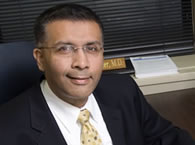News Release: Research, School of Medicine
Jul. 2, 2009
Emory Sound Science Podcast: Treating and Preventing Heart Failure
 Javed Butler, MD, MPH
Javed Butler, MD, MPHAlthough the U.S. mortality rate for heart failure has fallen in recent decades, heart failure itself is on the rise thanks to an aging population and a sharp increase in the prevalence of obesity.
Javed Butler, MD, MPH, director of heart failure research at Emory Healthcare and associate professor of medicine at Emory University School of Medicine, is looking for new ways to prevent and treat the condition. Butler and his colleagues recently created the Health ABC Heart Failure Model for predicting risk of new onset heart failure in the elderly. That model has now been strengthened by validating it via a library of patient data from an earlier cardiovascular study.
The results suggest the Health ABC risk model can be used to identify high-risk individuals for whom interventions can be cost-effectively targeted to prevent heart failure.
To listen to Butler's own words about heart failure and its treatment and prevention, access Emory's new Sound Science podcast at http://whsc.emory.edu/soundscience/.
"Heart failure is any condition in which the heart is unable to pump enough blood for the metabolic needs of the body, but that does not mean that the heart is not pumping or the heart has stopped working," says Butler. "Heart failure is not a disease but a syndrome, so there's a whole family of different diseases that can precede this condition. They're known collectively as heart failure."
Although the mortality rate for heart failure has decreased thanks to an improvement in therapies such as transplants, pacemakers, defibrillators and medications, Butler is now focusing his research on prevention through life style changes as well as models pinpointing who is at risk for heart failure.
"We need to start worrying about prevention," says Butler. "And I don't think we do nearly enough about prevention. I think this has become very important with the changing population dynamics in the United States."
Butler received his MD from Aga Khan University in Karachi, Pakistan. He completed his residency and chief residency at Yale University and a cardiology fellowship including transplant training at Vanderbilt University. Before moving to Emory University, he was the director for Vanderbilt's Heart and Heart-Lung Transplant programs .
Butler serves as the deputy chief science advisor for the American Heart Association and serves on the national board, events committee, and steering committees of several multi-center clinical trials.
###
The Robert W. Woodruff Health Sciences Center of Emory University is an academic health science and service center focused on missions of teaching, research, health care and public service. Its components include schools of medicine, nursing, and public health; Yerkes National Primate Research Center; the Emory Winship Cancer Institute; and Emory Healthcare, the largest, most comprehensive health system in Georgia. The Woodruff Health Sciences Center has a $2.3 billion budget, 17,000 employees, 2,300 full-time and 1,900 affiliated faculty, 4,300 students and trainees, and a $4.9 billion economic impact on metro Atlanta.
Learn more about Emory’s health sciences:
Blog: http://emoryhealthblog.com
Twitter: @emoryhealthsci
Web: http://emoryhealthsciences.org
